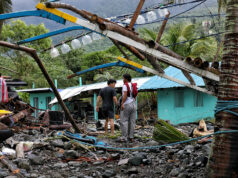Duterte confident Trump won’t take up human rights
PRESIDENT Rodrigo R. Duterte on Sunday, Nov. 12, expressed confidence that United States President Donald J. Trump won’t raise the issue of human rights when the two are expected to meet privately on the sidelines of the 31st Association of Southeast Asian Nations (ASEAN) Summit.

“I’m sure he (Mr. Trump) will not take it up,” Mr. Duterte said upon his arrival in Manila on Sunday from the Asia-Pacific Economic Cooperation (APEC) Summit in Vietnam.
Mr. Duterte said that when he met Mr. Trump in Vietnam on Saturday, the US President gave him “words of encouragement.”
“Words of encouragement. Not extrajudicial killing. Well, he cannot afford it. We do not talk about these things because, first of all, they are not true; and the second is, we do not do it,” Mr. Duterte said.
“He said something about, ‘You know, you handle it very well,’” he also said, quoting Mr. Trump on the anti-drug campaign in the Philippines.
Asked if he will discuss it with him in the coming days, Mr. Duterte replied: “He is not the Human Rights Commission. So, it’s only the representatives there. Because the US, like the Philippines, is run by three great departments.”
Also on Saturday, his spokesperson, Harry L. Roque, Jr. said, “I’m confident that President Trump, having endorsed Duterte’s war on drugs, will also see no necessity in bringing it up.”
On Saturday, Nov. 11, Amnesty International Philippines Director Jose Noel Olano said the ASEAN Summit would be an “opportunity to raise the horrifying human rights abuses that the region is facing,” and called on Mr. Trump to discuss that matter with Mr. Duterte.
The subject of human rights, to be sure, is also in the agenda of the ASEAN meetings, particularly those to be held in the island province of Bohol.
“When he comes face-to-face with President Duterte, he’ll be meeting a man whose policies are responsible for thousands of unlawful killings, including dozens of children and the extrajudicial execution of many others, which may constitute crimes against humanity,” Mr. Olano said.
“Trump must not keep ignoring the grave human rights situation in the Philippines. The US President’s willingness to challenge the appalling record of President Duterte’s ‘war on drugs’ is a crucial test of his administration’s commitment to upholding and defending human rights,” he added.
Messrs. Duterte and Trump are scheduled to hold a bilateral meeting today.
FIST PUMP
When Mr. Trump and other world leaders meet in the Philippines from Sunday, copying their controversial host’s signature fist salute could land them in hot water.
Mr. Duterte has adopted a clenched fist, often stuck out in front of his chest or sometimes at eye level, as his trademark gesture. He often seeks to have visitors pose for photos with him doing the salute, with Chinese internet tycoon Jack Ma and Hollywood actor Steven Seagal among those pictured doing so.
But critics warn the gesture has come to represent the brutalities of Mr. Duterte’s drug war, which has claimed thousands of lives.
They also say it has uncomfortable similarities with Nazi leader Adolf Hitler’s salute.
“Foreign leaders should recognize that the fist… symbolizes a purposeful attack by Duterte on rule of law that has inflicted a human rights calamity on thousands of Filipinos,” Phelim Kine, Human Rights Watch deputy Asia director, told AFP.
Australia’s spy chief, Nick Warner, was criticized when he returned home from Manila in August to find the Philippine government had released photos of him clenching his fist with Mr. Duterte.
Now eyes will be on whether Mr. Trump does the fist pump, having told Mr. Duterte in April he was doing a “great job” in his drug war.
Mr. Duterte might also expect support from Japanese Prime Minister Shinzo Abe, who struck the pose when the pair met in Tokyo last year.
A photo posted by Mr. Duterte’s aide on Facebook showed the two men smiling along with their officials, who also raised their fists against the backdrop of Japanese and Philippine flags.
Mr. Abe, whom Duterte has called a “true friend,” has not criticized the drug war. — with a report by AFP



